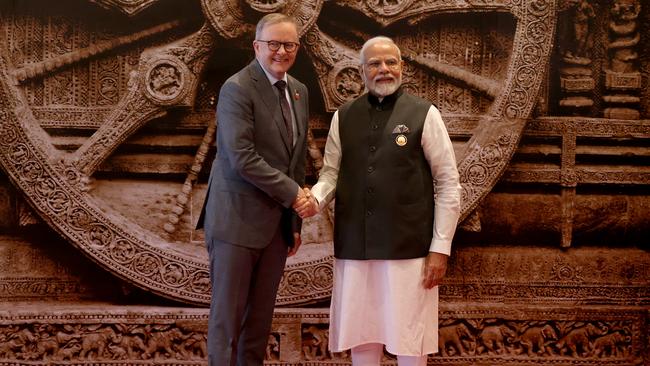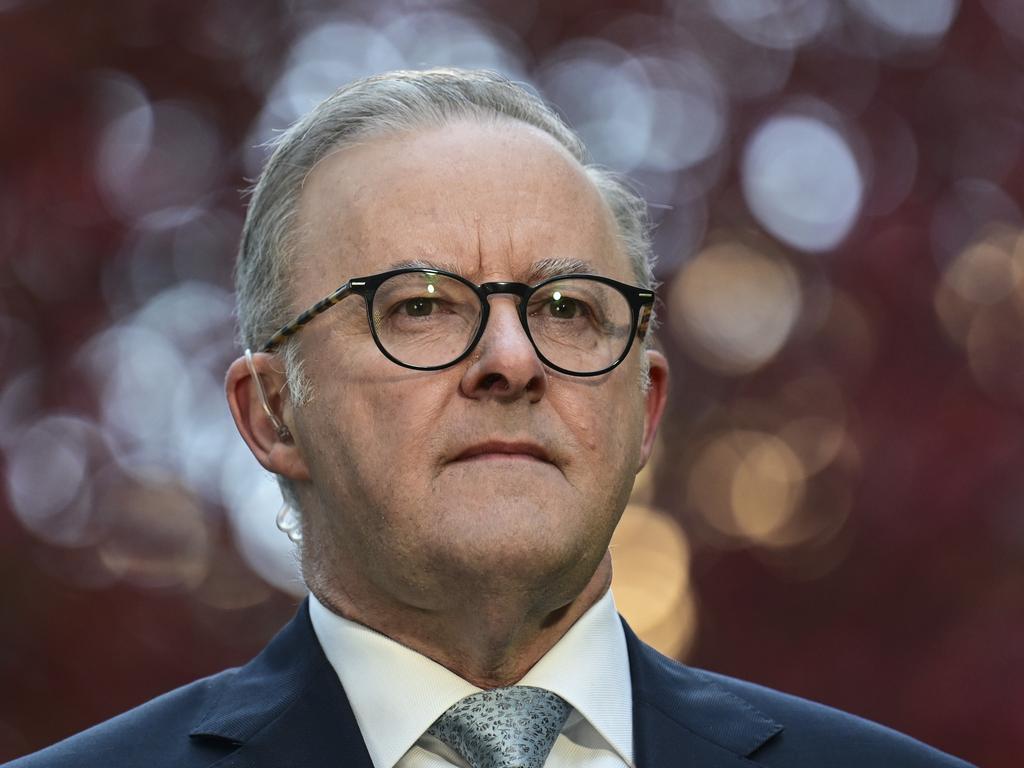Anthony Albanese defends G20 compromises on Ukraine, climate
Anthony Albanese has praised a watered-down communique at the G20 Leaders’ Summit in India that failed to condemn Russia’s invasion of Ukraine.

Anthony Albanese has hailed a watered-down communique at the G20 Leaders’ Summit in India that failed to condemn Russia’s invasion of Ukraine and made no demand on Australia to wind back its world-leading coal exports.
The Prime Minister told fellow G20 economy leaders he condemned “Russia’s illegal and immoral invasion of Ukraine … in the strongest terms”.
But the final G20 statement stopped well short of such language, calling instead for nations to respect their neighbours’ territory in line with the UN charter.
It referred to the war “in Ukraine”, rather than “against” it, and urged the “peaceful resolution of conflicts” through dialogue and diplomacy.
“Today’s era must not be of war,” the statement said, echoing a phrase used frequently by G20 host Narendra Modi.
Ukraine’s foreign ministry said the declaration was “nothing to be proud of”, criticising its failure to call out Russian aggression.
But Mr Albanese maintained the statement, which was endorsed by G20 members Russia and China, was the most strident yet from the international community.
“I think it’s an extraordinarily strong statement from the world at this G20 meeting,” he said.
“Russia has to have gotten the message that this is having a devastating impact, and that the world wants this war to stop.”
The declaration agreed by the world’s 20 largest economies called for a tripling of renewable energy capacity within existing global targets.
Australia’s status as the world’s largest coal exporter was not challenged by the statement, which argued only for “accelerating efforts towards phase-down of unabated coal power, in line with national circumstances”.
A day earlier, the UN warned a commitment to phase out fossil fuels was “indispensable”.
Mr Albanese said Australia will continue to be one of the world’s largest energy exporters, but “what we export will change”.
“We are expanding our capacity to provide the minerals, metals and clean energy components to help decarbonise our region,” he told the summit’s “One Earth” session on Saturday.
The Prime Minister said the science was clear and “our climate has already changed”.
But he told Japanese Prime Minister Fumio Kishida in a bilateral meeting on the sidelines of the summit that Australia would remain a reliable exporter of fossil fuels.
“Australia is a reliable energy partner. Part of the transition is gas,” Mr Albanese said. “Gas will play an important role in stabilising energy grids, as we move to more use of renewables.”
While the Albanese government has made no specific commitment to cut coal exports, earnings from thermal coal sold on the international market are forecast to fall to $38 billion in 2023-24 from $64bn the previous year.
LNG exports are also expected to dip from to $70bn in 2023-24 from $92bn in 2022-23.
G20 countries account for 85 per cent of global GDP and a similar amount of global warming emissions.
Brazilian President Luiz Inacio Lula da Silva told the summit that the planet was facing an “unprecedented climate emergency”, and called on rich nations to provide US$100bn-a-year to fight global warming.
The potential the summit could end without an agreed statement had loomed as a threat the Indian Prime Minister’s Modi’s hopes to use the summit to burnish his country’s global status.
The US, EU and India, together with key Middle Eastern nations, used the G20 Summit to announce a new infrastructure fund to developing countries to rival China’s Belt and Road Initiative.
The multinational rail and ports deal will link the Middle East to South Asia, and comes amid rising criticism the BRI as am instrument of Chinese “debt trap diplomacy”.
In another major development, the African Union was made a permanent member of the G20, expanding the group of the world’s richest and most powerful nations to include representatives of some of the world’s poorest.
Mr Modi had dedicated the summit to advancing the interests of the world’s “global south” of developing nations.
It will give the 55-member AU the same status within the grouping as the European Union, which was previously the only regional bloc represented.
The African Union had previously attended G20 summits as an “invited international organisation”.








To join the conversation, please log in. Don't have an account? Register
Join the conversation, you are commenting as Logout